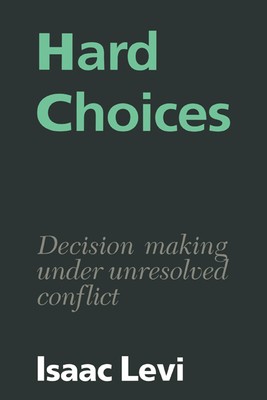
- We will send in 10–14 business days.
- Author: Isaac Levy
- Publisher: Cambridge University Press
- ISBN-10: 0521386306
- ISBN-13: 9780521386302
- Format: 15.2 x 22.8 x 1.9 cm, softcover
- Language: English
- SAVE -10% with code: EXTRA
Reviews
Description
It is a commonplace that in making decisions agents often have to juggle competing values, and that no choice will maximize satisfaction of them all. However, the prevailing account of these cases assumes that there is always a single ranking of the agent's values, and therefore no unresolvable conflict among them. Isaac Levi denies this assumption, arguing that agents often must choose without having balanced their different values and that to be rational, an act does not have to be optimal, only what Levi terms "admissible." This book explores the consequences of denying the assumption and develops a general approach to decision-making under unresolved conflict. Professor Levi argues not only against the "strict Bayesian" position, but also against all the recent attempts to develop alternative models to Bayesianism. The book, which continues from his earlier The Enterprise of Knowledge, is certain to make an original and controversial contribution to the debates over choice theory.
EXTRA 10 % discount with code: EXTRA
The promotion ends in 19d.10:23:44
The discount code is valid when purchasing from 10 €. Discounts do not stack.
- Author: Isaac Levy
- Publisher: Cambridge University Press
- ISBN-10: 0521386306
- ISBN-13: 9780521386302
- Format: 15.2 x 22.8 x 1.9 cm, softcover
- Language: English English
It is a commonplace that in making decisions agents often have to juggle competing values, and that no choice will maximize satisfaction of them all. However, the prevailing account of these cases assumes that there is always a single ranking of the agent's values, and therefore no unresolvable conflict among them. Isaac Levi denies this assumption, arguing that agents often must choose without having balanced their different values and that to be rational, an act does not have to be optimal, only what Levi terms "admissible." This book explores the consequences of denying the assumption and develops a general approach to decision-making under unresolved conflict. Professor Levi argues not only against the "strict Bayesian" position, but also against all the recent attempts to develop alternative models to Bayesianism. The book, which continues from his earlier The Enterprise of Knowledge, is certain to make an original and controversial contribution to the debates over choice theory.


Reviews